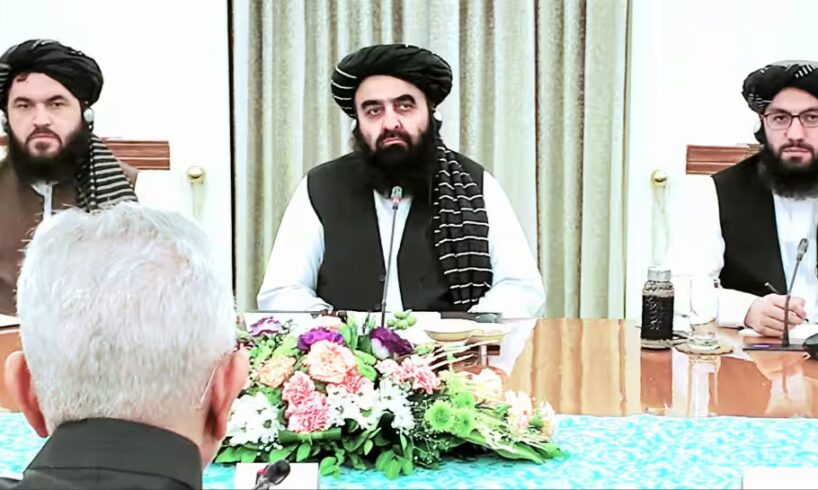
In a visit rich with symbolism and diplomacy, Afghanistan’s acting Foreign Minister, Maulana Amir Khan Muttaqi, travelled to the renowned Darul Uloom Deoband seminary in Uttar Pradesh’s Saharanpur district on Saturday. This marks his first visit to India since the Taliban’s return to power in 2021, underscoring both spiritual ties and a potential thaw in India-Taliban relations.
The seminary rolled out an elaborate welcome for Muttaqi, who arrived in Deoband around noon after departing Delhi earlier in the morning. A group of 15 prominent Ulema (Islamic scholars) were appointed to receive him, and heavy security was deployed across the region in coordination with state and national agencies.
Darul Uloom’s rector, Maulana Mufti Abul Qasim Nomani, led the welcome ceremony. Students and faculty showered flower petals on the Afghan minister, while many gathered to take selfies and videos of the rare high-profile visit.
Add Zee News as a Preferred Source
Inside the institution’s central library, Muttaqi participated in a formal scholarly session under the guidance of Maulana Nomani, where he studied a Hadith (Prophetic tradition). He later requested and was granted permission to teach Hadith, receiving a Sanad (certificate of authority). This confers upon him the academic title “Qasmi”, a prestigious recognition linking him to the historic seminary. He is now formally entitled to use the name Maulana Amir Khan Muttaqi Qasmi.
Reconnecting With Alma Mater
Speaking at the event, Jamiat Ulama-e-Hind president Maulana Arshad Madani remarked, “We share an educational and academic relationship with Afghanistan. He has come to visit his alma mater, and after that, he will hold discussions with us.”
Muttaqi expressed gratitude for the warm hospitality, calling it a moment of joy and significance. “I am thankful for such a grand welcome and the affection shown by the people here. I hope that India-Afghanistan ties advance further. We will be sending new diplomats, and I hope you people will visit Kabul as well,” he said, adding that the reception in Delhi and Deoband gave him hope for stronger bilateral relations. “The future of India-Afghanistan relations seems very bright.”
#WATCH | Saharanpur, Uttar Pradesh | Afghan FM Amir Khan Muttaqi says, “The journey has been very good so far. Not just the people of Darul Uloom, but all people of the area have come here. I am grateful to them for the warm welcome they extended to me… I am thankful to the… pic.twitter.com/TQ7dUwRqPU
— ANI (@ANI) October 11, 2025
Diplomatic Undertones
Muttaqi is the most senior Taliban official to visit India since the group regained control of Afghanistan following the withdrawal of US forces in 2021. He arrived in Delhi on Thursday from Russia and met with Indian External Affairs Minister Dr S. Jaishankar on Friday. His six-day visit is seen as a significant gesture in India’s cautious engagement with the Taliban regime, which is still not formally recognised by New Delhi or most of the international community.
While the visit holds political weight, Muttaqi himself has stressed its deeper meaning. “Deoband is a major centre for the Islamic world. Afghanistan and Deoband share a long-standing connection. We want our students to continue coming here for religious education, just as they do for engineering and science,” he said.
Historical Significance Of Darul Uloom Deoband
Founded in the late 19th century by Islamic scholars including Sayyid Muhammad Abid, Fazlur Rahman Usmani, Mahtab Ali Deobandi and Muhammad Qasim Nanautawi, Darul Uloom Deoband has long been a leading centre for Islamic learning in South Asia. The seminary is dedicated to the teaching of manqulat, religious sciences based on the Quran and Hadith.
According to the seminary’s official records, it now consists of 34 departments and has over 4,000 students enrolled as of 2020. Students undergo an eight-year course to earn the degree of ‘Maulana’ and may choose to specialise further in subjects like Hadith, Fatwa, Tafseer (Quranic exegesis), literature, English or computer studies.
Interestingly, the curriculum also includes weekly sessions on Hindu religion and philosophy to help students develop a more comprehensive understanding of India’s diverse cultural and religious landscape.
Afghanistan’s Deep Ties To Deoband
Darul Uloom Deoband holds significant influence among Afghan religious circles. Many Taliban leaders revere the seminary, and its ideological footprint can be traced to institutions like Darul Uloom Haqqania in Pakistan’s Khyber Pakhtunkhwa, founded by Maulana Abdul Haq, a Deoband alumnus. His son, Sami-ul-Haq, known as the “Father of the Taliban”, played a major role in shaping the religious and political philosophy of the movement.
“The place and its people have a long history with Afghanistan,” Muttaqi reiterated during his visit. “Deoband is a significant religious centre for us.”
A Strategic And Symbolic Gesture
While diplomatic engagements between India and the Taliban have remained limited, this visit signals a willingness to maintain communication channels. The stop at Deoband, however, transcends geopolitics, reinforcing centuries-old educational and religious bonds between India and Afghanistan.
For the Taliban foreign minister, the visit was not merely a return to his spiritual roots but also an opportunity to foster goodwill and cultural diplomacy in a region critical to the future of India-Afghanistan relations.





